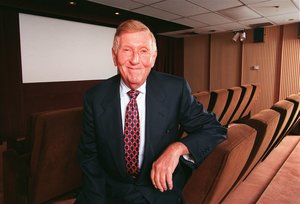August 12, 20208:16 AM ET
By Elizabeth Blair for NPR
Media titan Sumner Redstone, who built the company Viacom into a global empire, died Tuesday at his home in Los Angeles. He was 97. Through shrewd investing and strategic deal-making, Redstone became one of the world’s most powerful and unpredictable corporate leaders.
Redstone made his formula for success sound easy: “Content is king,” was his mantra. From SpongeBob SquarePants to The Daily Show, Titanic to Homeland, Redstone reigned over an astonishing wealth of content through the cable networks and movie studios owned by his corporation. The formidable Viacom umbrella includes such brands as Showtime, MTV, BET, Comedy Central, Nickelodeon, Simon & Schuster publishing and Paramount Pictures.

As if that weren’t enough for one lifetime, Redstone was also a majority shareholder of CBS Corporation. In 2006, he split Viacom and CBS into two separate companies. In 2019 the two merged back together to create ViacomCBS.
The Boston-bred Redstone did not gain control of these dynasties by being a nice guy. He was called “combative,” “irascible,” a “control freak” and a lot worse. “Sumner was one of the most colorful and wily media moguls on the stage,” says Los Angeles Times media writer Meg James.
His life was epic. He was a star student in grade school. He was a codebreaker during World War II. After Harvard Law, he took a job with the Justice Department. When he was about 30, he went to work for his father, who owned a few drive-in theaters in New England. Redstone eventually turned the theater chain his father founded in 1936, National Amusements, into a global powerhouse.
Here’s where Redstone made his first major mark in the entertainment business: He was an early champion of the multiplex. As far back as the 1970s, Redstone saw that home entertainment posed a real threat to movie theaters. Americans, he recognized, wanted theaters located closer to their suburban homes with parking and other conveniences. Read more from NPR.
Stay informed: Follow News Without Politics




